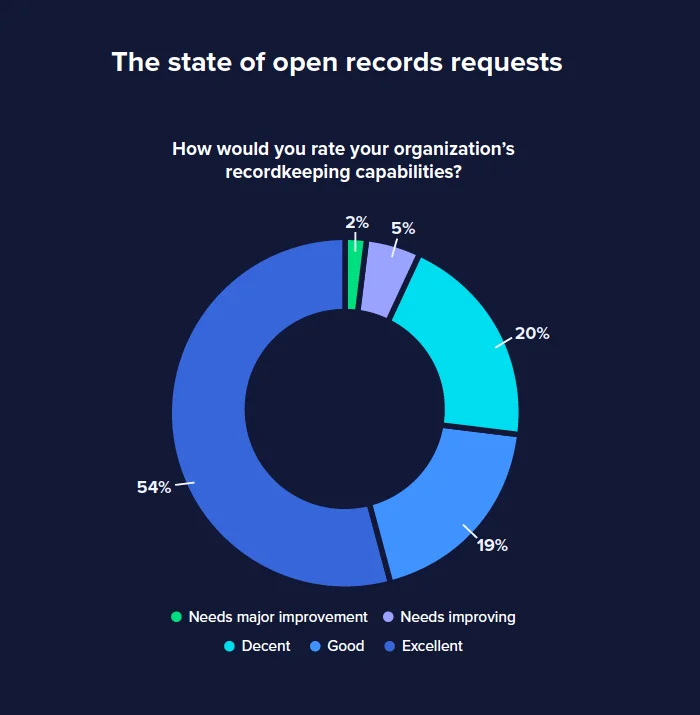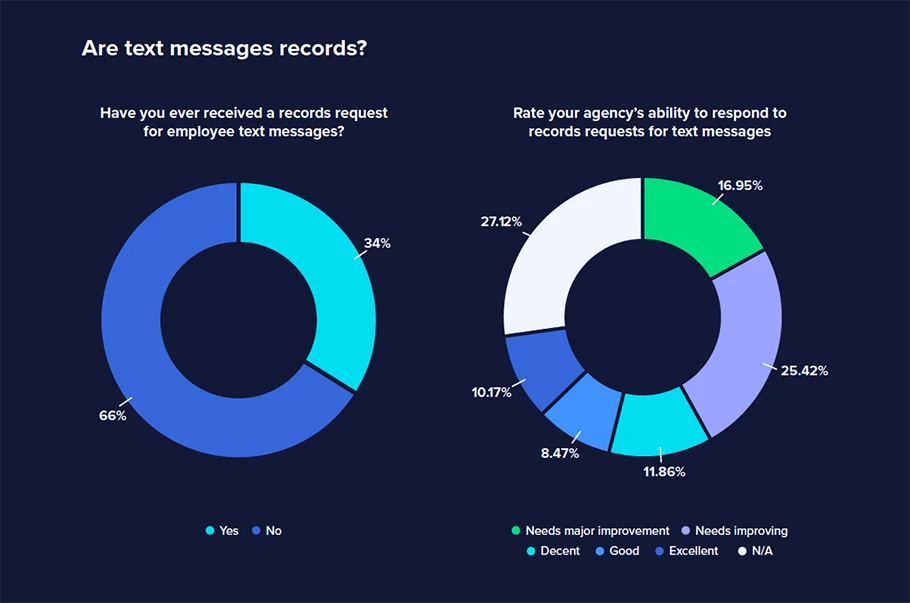Nearly Half of Government Agencies Can Improve Their Open Records Requests Process
While it’s a sound theory that digital communications boost productivity, efficiency and transparency in government organizations, it’s important to balance that promise with the realities of limited budgets, outdated technologies and the rising demands of public records requests.
In a recent survey, we examined how government entities handle their records management processes and their overall ability to respond to public records requests. Here’s a preview of the findings (but be sure to get the full report here.)
Fulfilling open records requests is of utmost importance — and needs improvement
State-mandated Sunshine laws and the Freedom of Information Act (FOIA) require the retention of all government-related electronic communications for the purpose of fulfilling public records requests.
There’s universal agreement and understanding across all survey participants that they must adhere to their state recordkeeping and open records laws — even for roles not directly involved with recordkeeping.

That’s easier said than done. Government agencies are using all kinds of digital communications channels to interact today – Facebook, text messaging, Microsoft Teams and many more. According to a recent Granicus Public Records Complexity Benchmark Report, since 2018:
- Record request volume is up 94%
- Quantity of response documents sent to requesters is up 73%
- File size of those documents is up 322%
If government agencies let communication trends, habits and technologies outpace their records management, they risk creating a complex web of unsearchable records that are impossible to retrieve and produce upon request.
Agencies still struggle with text messages
Text messaging has become the standard way to communicate with personal and business contacts. When government employees text between mobile devices on the job, these messages are public records and must, by law, be preserved.
Even if an organization doesn't allow text messaging but employees do it anyway, that’s a problem. If the organization receives a public records request that includes all related text conversations, it will fail to produce a complete response. That’s a litigable offense.

For respondents who responded “not applicable” to responding to records requests for text messages, almost 20% allow the use of SMS/text messages in their agencies.
Many government agencies’ recordkeeping processes are falling behind
One of the biggest challenges for survey respondents is indexing records data. Large, unstructured data — such as audio, video or text — is hard to keep track of, because it's abundant and requires substantial management, metadata and storage space. This can be especially difficult at the local level where funding may not be as readily available.
And when data is hard to index or organize, it’s even harder to find.
“If half the communications can’t be provided, that’s a huge problem because that’s how people find out what their government is up to,” says David Cuillier, director of the Brechner Freedom of Information Project at the University of Florida.
As Cullier noted, it “puts a crimp on the whole process” if records cannot be retrieved, archived, searched or redacted. “The ease of requesting records electronically and the difficulty in finding records electronically, which is counterintuitive,” Cuillier explained.
Get the full report
More records requests are being made than before, and those requests are getting more complex. At the same time, the public is expecting — and demanding — greater transparency from their government agencies.
There’s a lot to unpack, so be sure to get the full survey results and analysis.
Share this post!
Smarsh Blog
Our internal subject matter experts and our network of external industry experts are featured with insights into the technology and industry trends that affect your electronic communications compliance initiatives. Sign up to benefit from their deep understanding, tips and best practices regarding how your company can manage compliance risk while unlocking the business value of your communications data.
Ready to enable compliant productivity?
Join the 6,500+ customers using Smarsh to drive their business forward.




Subscribe to the Smarsh Blog Digest
Subscribe to receive a monthly digest of articles exploring regulatory updates, news, trends and best practices in electronic communications capture and archiving.
Smarsh handles information you submit to Smarsh in accordance with its Privacy Policy. By clicking "submit", you consent to Smarsh processing your information and storing it in accordance with the Privacy Policy and agree to receive communications from Smarsh and its third-party partners regarding products and services that may be of interest to you. You may withdraw your consent at any time by emailing privacy@smarsh.com.
FOLLOW US